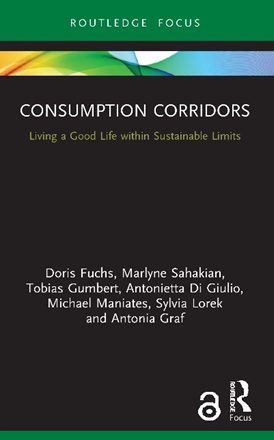


"Consumption Corridors are a powerful instrument for responsibly pursuing the good life in a world of ecological and social limits. Defined by minimum consumption standards allowing every individual to live a good life, and maximum standards guaranteeing the chance to live a good life for others, consumption corridors allow to envision and implement the social change needed to make living well within limits a reality. Minimum consumption standards will ensure that individuals living now or in the future are able to satisfy their needs, safeguarding access to the necessary quality and quantity of ecological and social resources. Maximum consumption standards, in turn, are needed to ensure that consumption by some individuals does not threaten the opportunity for a good life for others. The space between the floor of minimum consumption standards and the ceiling of maximum consumption standards produces a sustainable consumption corridor. It is the space within which individuals may make their consumption choices freely and sustainably” (Fuchs et al., 2021, p. 33).
Das Konzept der Konsumkorridore wurde im Zuge einer Kollaboration zwischen deutschen und Schweizer Forscher*innen zum nachhaltigen Konsum entwickelt (Blättel-Mink et al. 2011) und ist seit diesem Zeitpunkt von einer wachsenden Zahl internationaler Forschungsaktivitäten erweitert und angewandt worden (e.g. Special Issue on Consumption Corridors of Sustainability: Science, Practice, and Policy, 2021). Aufgrund seines Potenzials der Förderung der Nachhaltigkeitstransformation steht es im Fokus umfangreicher, aktueller Forschung. Im Folgenden führen wir unsere Beiträge zur Literatur zu Konsumkorridoren auf und darunter relevante Publikationen anderer Wissenschaftler*innen, als Ressource für alle, die an dem Thema interessiert sind.
Hier geht es zum Buch: https://doi.org/10.4324/9780367748746.
Perspektiven
- Kanerva, Minna. 2022. The relationship between consumption corridors and recent sustainability-focused economic models. Perspectives on Consumption Corridors 1, Kanerva 2022 The Relationship Between Consumption Corridors And Recent Sustainability-focused Economic Models
Unsere Beiträge
- Fuchs, Doris, Marlyne Sahakian, Tobias Gumbert, Antonietta Di Giulio, Michael Maniates, Sylvia Lorek und Antonia Graf. 2021. Consumption Corridors: Living Well within Sustainable Limits. London: Routledge. library.oapen.org/handle/20.500.12657/46919.
- Fuchs, Doris, Julia Steinberger, Elke Pirgmaier, William Lamb, Lina Brand-Correa, und Jonathan Cullen. 2021. A corridors and power-oriented perspective on energy service demand and needs satisfaction. Sustainability: Science, Practice and Policy 17(1): 163-173, doi.org/10.1080/15487733.2021.1912907.
- Gumbert, Tobias, und Carolin Bohn. 2021. Are liberal objections to consumption corridors justified? On the relation of freedom and limits in green liberal thought, Sustainability: Science, Practice and Policy, 17:1, 91-102. https://doi.org/10.1080/15487733.2021.1878733.
- Sahakian, Marlyne, Doris Fuchs, Antonietta Di Giulio, and Sylvia Lorek. 2021. Consumption corridors: advancing the concept and exploring its implications. Sustainability: Science, Practice and Policy 17(1): 305-315, DOI: https://doi.org/10.1080/15487733.2021.1919437
- Fuchs, Doris. 2020. „Living Well within Limits: the Vision of Consumption Corridors“. In Kalfagianni, Agni, Doris Fuchs und Anders Hayden (Hrsg). Routledge Handbook of Global Sustainability Governance. London: Routledge, 296-307.
- Jaeger-Erben, Melanie, Birgit Blättel-Mink, Doris Fuchs, Konrad Götz, Nina Langen, Henrike Rau. 2020. Grenzen des Konsums im Lebensverlauf: Gelegenheiten, Hürden und Gestaltungsspielräume GAIA 29/4: 218 – 223, doi.org/10.14512/gaia.29.4.4.
- Fuchs, Doris, Sylvia Lorek, Antonietta Di Giulio und Rico Defila. 2019. „Sources of power for sustainable consumption: Where to look”. in Martiskainen, Mari, Lucie Middlemiss und Cindy Isenhour (Hrsg.). Power and Politics in Sustainable Consumption Research and Practice. London: Routledge, 62-83.
- Fuchs, Doris, und Sophie Dolinga. 2019. Das richtige Maß finden. Wege der Transformation zu nachhaltigem Konsum. AMOS International 13(1): 24-32.
- Fuchs, Doris. 2017. „Consumption Corridors as a Means for Overcoming Trends in (Un-)Sustainable Consumption”. In Bala, Christian und Wolfgang Schuldzinski (Hrsg.). International Conference on Consumer Research 2016: The 21st Century Consumer: Vulnerable, Responsible, Transparent? Düsseldorf: Verbraucherzentrale NRW, 147-159, DOI 10.15501/978-3-86336-918_13.
- Fuchs, Doris und Antonietta Di Giulio. 2016. „Consumption corridors and social justice: exploring the limits.” In Lorek, Sylvia, und Edina Vadovics. (Hrsg.). Sustainable Consumption and Social Justice in a Constrained World. SCORAI Europe Workshop Proceedings, August 29-30, 2016, Budapest, Hungary. Sustainable Consumption Transitions Series, Issue 6.
- Di Giulio, Antonietta und Doris Fuchs. 2014. „Sustainable Consumption Corridors: Concept, Objections, and Responses”. GAIA 23/S1: 184-192.
- Blättel-Mink, B., B. Brohmann, R. Defila, A. Di Giulio, D. Fischer, D. Fuchs, S. Gölz, K. Götz, A. Homburg, R. Kaufmann-Hayoz, E. Matthies, G. Michelsen, M. Schäfer, K. Tews, S. Wassermann und S. Zundel. 2013. Konsum-Botschaften. Was Forschende für die gesellschaftliche Gestaltung nachhaltigen Konsums empfehlen. Stuttgart: S. Hirzel Verlag.
Audio-/Videoressourcen
-
Bartz, Michael (2023): Rethinking Growth Part 6: The Good Life [Audio-Podcast]. In Over My Head [Podcast] 9. Juni, [online] https://www.inovermyheadpodcast.com/episodes/rethinking-growth-part-6-the-good-life
-
Weitere Literatur zu Konsumkorridoren
- Cué Rio, M., Bovenkerk, B., Castella, JC. et al. 2022. The elephant in the room is really a cow: using consumption corridors to define sustainable meat consumption in the European Union. Sustainability Science. https://doi.org/10.1007/s11625-022-01235-7.
- Kanerva, Minna. 2022. Consumption Corridors and the Case of Meat. https://link.springer.com/article/10.1007/s10603-022-09524-5.
- Kevin Joseph Dillman, Michał Czepkiwicz, Jukka Heinonen & Brynhildur Davíðsdóttir. 2021. A safe and just space for urban mobility: a framework for sector-based sustainable consumption corridor development, Global Sustainability, 4:28, 1-17, DOI: https://doi.org/10.1017/sus.2021.28
- Brand-Correa, Lina, Giulio Mattioli, William Lamb & Julia Steinberger. 2020. Understanding (and tackling) need satisfier escalation, Sustainability: Science, Practice and Policy, 16:1, 309-325, DOI: 10.1080/15487733.2020.1816026
- Coote, Anna. 2021. Universal basic services and sustainable consumption, Sustainability: Science, Practice and Policy, 17:1, 32-46, DOI: 10.1080/15487733.2020.1843854
- Defila Rico & Antonietta Di Giulio. 2020. The concept of "consumption corridors" meets society – how an idea for fundamental changes in consumption is received. Journal of Consumer Policy, 43: 315-344. doi: 10.1007/s10603-019-09437-w
- Di Giulio Antonietta & Rico Defila. (2021, in press): Building the Bridge between Protected Needs and Consumption Corridors. Sustainability: Science, Practice and Policy. doi: 10.1080/15487733.2021.1907056
- Di Giulio A., Defila R. (2021): Sustainable consumption: from environmental concerns to including justice and quality of life. In: Bulletin SAGW 2/21: Konsum | Consommation, SAGW. S. 42-46. doi: http://doi.org/10.5281/zenodo.5013935
- Godin, Laurence, Senja Laakso & Marlyne Sahakian. 2020. Doing laundry in consumption corridors: wellbeing and everyday life, Sustainability: Science, Practice and Policy, 16:1, 99-113, DOI: 10.1080/15487733.2020.1785095
- Gough, Ian. 2020. Defining floors and ceilings: the contribution of human needs theory, Sustainability: Science, Practice and Policy, 16:1, 208-219, DOI: 10.1080/15487733.2020.1814033
- Guillen-Royo, Mònica. 2020. Applying the fundamental human needs approach to sustainable consumption corridors: participatory workshops involving information and communication technologies, Sustainability: Science, Practice and Policy, 16:1, 114-127, DOI: 10.1080/15487733.2020.1787311
- Pirgmaier, Elke. 2020. Consumption corridors, capitalism and social change, Sustainability: Science, Practice and Policy, 16:1, 274-285, DOI: 10.1080/15487733.2020.1829846
- Sahakian; Marlyne & Manisha Anantharaman. 2020. What space for public parks in sustainable consumption corridors? Conceptual reflections on need satisfaction through social practices, Sustainability: Science, Practice and Policy, 16:1, 128-142, DOI: 10.1080/15487733.2020.1788697
- Vladimirova, Katia. 2021. Consumption corridors in fashion: deliberations on upper consumption limits in minimalist fashion challenges, Sustainability: Science, Practice and Policy, 17:1, 103-117, DOI: 10.1080/15487733.2021.1891673
Konferenzen und Workshops
- 2022, Vortrag zum Thema "Consumption Corridors: Living Well Within Limits" im Rahmen der Konferenz zu Grenzen des Wachstums im Bundesumweltministerium, Doris Fuchs
- 2021, Universität Genf
- 2020, Internationaler, virtueller Workshop zu Consumption Corridors: Living Well within Limits, WWU Münster
- 2019 Internationaler Workshop zu “Exploring concepts and implications”, organisiert von Marlyne Sahakian, Manisha Amarantham, Antonietta Di Giulio, Doris Fuchs, Sylvia Lorek und Julia Steinberger, finanziert vom Schweizer Nationalfond, Universität Genf. Proceedings: https://scorai.net/wp-content/uploads/wordpress/Sustainable-Consumption-Transition-Series-Issue-7.pdf
- 2018 Panel Serie zu “Living well in a world of limits: advances in the study of sufficiency, needs and wellbeing” organisiert von Antonietta Di Giulio, Doris Fuchs, Sylvia Lorek und Marlyne Sahakian auf der Internationalen Konferenz der Sustainable Consumption Research and Action Initiative, Kopenhagen
- 2016 und 2017 Konsumkorridore, Internationaler Workshop, WWU Münster
- 2015 Nachhaltiger Konsum und Gerechtigkeit, Internationaler Workshop, WWU Münster
- 2014 Nachhaltiger Konsum und Macht, Internationaler Workshop, WWU Münster
- 2013 Structural Prerequisites for Sustainable Societies and the Good Life, Internationale Konferenz, WWU Münster, organisiert gemeinsam mit SCORAI Europe. Proceedings: https://repositorium.uni-muenster.de/document/miami/ aa2a8e28-d81d-4a20-bbb5-a49168e561e7/sgdp_2013_01.pdf

